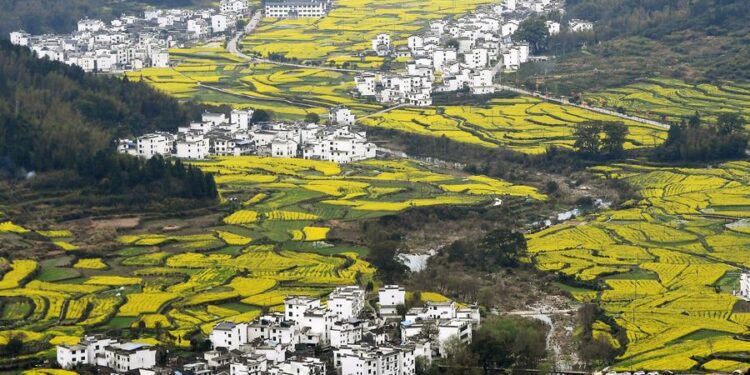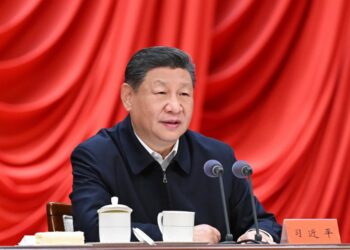Since mid-March, Wuyuan, whose landscapes have been among the most beautiful in China, has entered her most enchanting season.
The wavy hills and the full blooming flowers invite waves of visitors to attend this natural spectacle, transforming Wuyuan, a district of the province of Jiangxi, in the east of China, in a haven animated with beauty and cultural charm.
Wake up the old residences
Dotted with historical sites and ancient residences of the Ming and Qing dynasties (1368-1911), Wuyuan has a total of 30 traditional villages. In 2012, the government of the district adopted measures to protect and develop old villages and buildings by encouraging adoption and relocation.
Jiusitang, the house of a former businessman whose construction began in 1902, constitutes the first old house adopted in Wuyuan. Wu Zhixuan, who adopted this home of more than 500 m², indicates that, to keep Jiusitang, it is necessary to “wake up” rather than simply renew, while maintaining its appearance and its character.
According to Mr. Wu, keeping an ancient home does not simply consist in protecting its architecture, but also in perpetuating its culture. You have to go to the art of living, the attitude of life and the way of life of the ancestors.
Wuyuan has implemented several modes of conservation and exploitation of old residences in accordance with local conditions and has also allocated funds to protect ecology and the environment, ensuring good concordance between the natural landscape and the historical appearance.
From the landscape to science
As part of rural revitalization efforts, Wuyuan continues to transform its local resources into a prosperous and diversified tourism industry. A nature education center managed by a group of young graduates, aged on average under the age of 30, has become a very popular destination, enthusiastic participants having to reserve their places three months in advance.
From the exploration of wetlands to the construction of bird nests, including the observation of bacteria under the microscope, the practical activities of the education center captivate children as parents.
“We use the natural beauty of Wuyuan and our expertise to make science fun and accessible,” said Liu Zhilong, who heads the nature education center, adding that more than 60,000 children and 10,000 parents participated in their lessons.
These achievements arise from the revolutionary system of Wuyuan’s “natural mini-reservations”, launched in the early 1990s. Today, the district has 193 of these reserves, which extend over 43,600 hectares and protect rare species.
Destination for foreigners
This idyllic lifestyle has not only attracted Chinese visitors, but also prompted the installation of many foreigners. Among them, Edward Gawne, the first British national to have opened a reception house in Wuyuan.
“There are trees, bridges, flowing water and beautiful Huizhou style houses. This is how I imagined traditional Chinese culture,” explains Mr. Gawne.
With the constant expansion of the Chinese high -speed rail network, which facilitates access to the formerly isolated countryside, Wuyuan even aroused the interest of foreign travelers.
“Our guest room served as a bridge for cultural exchanges between China and the West. About 90% of our hosts are foreigners, who can thus appreciate the beauty of traditional Chinese villages and discover the popular culture and customs of Wuyuan and Jiangxi,” explains Mr. Gawne.
The story of Wuyuan is a brilliant example of how efforts to reduce poverty and rural revitalization of China have transformed the lives of rural inhabitants.
Since the 2000s, Wuyuan has adopted an integrated agriculture-tourism integrated development model, combining traditional agriculture and tourism to develop distinctive industries, such as the culture of rapeseed and chrysanthemum.
Xu Shubin, party leader for the district, notes that Wuyuan has managed to transform his ecological assets into economic advantages. The villagers, who today harvest the fruits of this green development, have become even more determined to protect their beautiful native land.
“This commitment has favored a win-win cycle. Environmental protection stimulates the green economy, and the resulting success encourages the villagers to take even more care of their natural environment, which promotes a real harmony between man and nature,” explains Mr. Xu.








